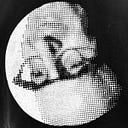hard hat zone.
It’s not only what he said, it’s how he said it too. He’s the quiet type, you know, he speaks quietly, too, almost too quietly, with very little intonation. Long and beautifully constructed sentences with a rich vocabulary, except that when you hear the words, it’s all a bit monotonous, not unlike a medieval chant repeated over and over in some monastery by guys in cloaks made out of potato sacks and having invisible faces. That kind of chant. And I’m not saying that what he was talking about was boring or irrelevant – and of course I’m not implying that monks are boring or that they don’t make sense, but that’s beside the point – no, on the contrary: I used all my concentration to follow him, because I knew he was making a delicate argument. One that I found fairly difficult to decipher, to be frank. But I listened and did my best to make sense of it. And then all of a sudden he stresses that word. He stressed it so hard he almost raised his voice. “Wavering,” he said and paused for dramatic effect. Actually, he used the words “wavering disenchantment” repeatedly, for a good part of his explanation. Explanation or diatribe – depending on how you look at it. In any case, hard as I was concentrating on each word he said and was trying to keep as close as possible to the meaning of his words, expressions and concepts coming through his unrestrained flow of consciousness, I was completely thrown by the emphasis he put on “wavering disenchantment.” It was my duty, in a way, to make sense of what later turned out to be his parting message and that responsibility weighed on me. But hearing the words so prominently accentuated – “wavering disenchantment!” – I could no longer pay attention. I was in my own universe, probably just as confused as him, feeling like a piece of rock happily shooting through vacuum and suddenly bouncing into another thing travelling across space, a pure accident or a premeditated act, assuming you are willing to attribute the capacity of premeditation to inanimate masses of matter loitering in space. And I began to wonder: was this really the first time I was not sure I understood what he was saying? Or did I miss other bits before? Perhaps I got him wrong on more occasions than I was aware of. Or perhaps I never understood him at all. That certainly was a possibility. “Do you see my point?” he asked just after I realised I no longer did. I was unable to respond. And I don’t think he expected a response. The question “Do you see my point?” was just as impossible to comprehend as the concept of “wavering disenchantment.” Then I nodded. And I immediately realised that my nod might have meant “Yes, I see your point,” just as easily as it might have been an admission: “No, I have no clue of what you’re going on about.” My nod was acknowledged by the blankest stare. As if a blind man was looking at me and I knew he cannot see a thing. And after that there was no more conversation. He was silent, because he was finished. He wasn’t aware of the fact that most of what he’d said fell on deaf ears and not because I wasn’t interested or lacked the capacity to understand, but simply because we were a complete failure at communicating. And I said nothing because I knew that the best I could do was to not increase the level of confusion. The confusion of a perceived and assumed understanding, one that never existed between us. But I’m not answering your question. At that point what he way saying was pretty much irrelevant. He was desperately trying to keep the status quo. What was between us was his cocoon, his padding, his buffer zone. His one and only objective was to protect that and curl up in that warm and relatively safe place for one more week, one more day, for just one more hour. So that he doesn’t have to think, communicate or indeed feel for that one more week, day or hour. That was his strategy. Dig a ditch, bury himself, and wait for time to pass. And that was precisely why his words no longer meant anything to me. And that is precisely why those two words that he stressed more than the other one hundred thousand made it impossible for me to focus on whatever I heard after. Words, sentences, syntax, meaning – none of those existed any more. He was bare muscle obsessing on making me believe something I had doubted from the very beginning. His effort was futile. Completely. And it was those two words that made me realise it. That’s all I can offer as a response. I’m sorry if you were expecting something clearer, something more specific. Specific is not what that evening was all about, I guess. “Wavering disenchantment.” What does it mean, anyway?
